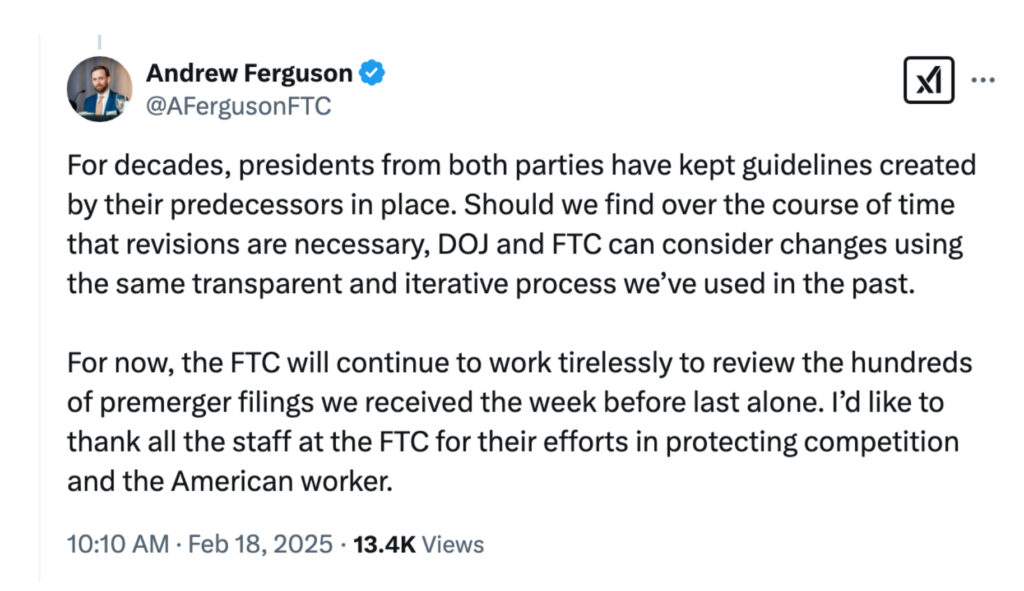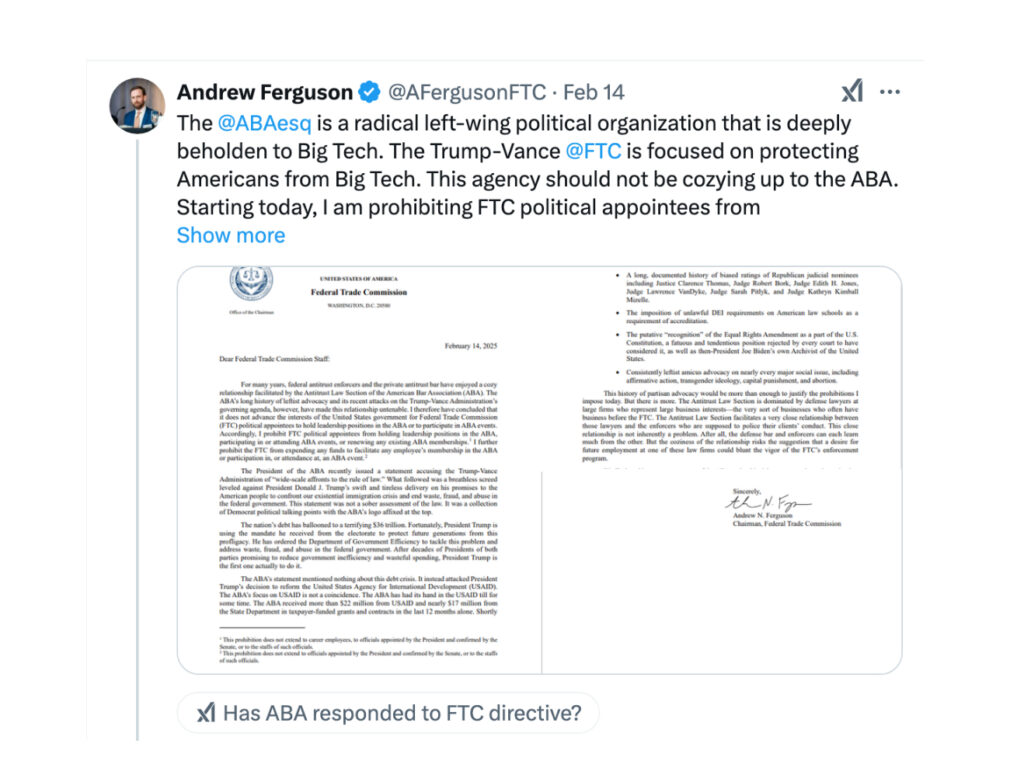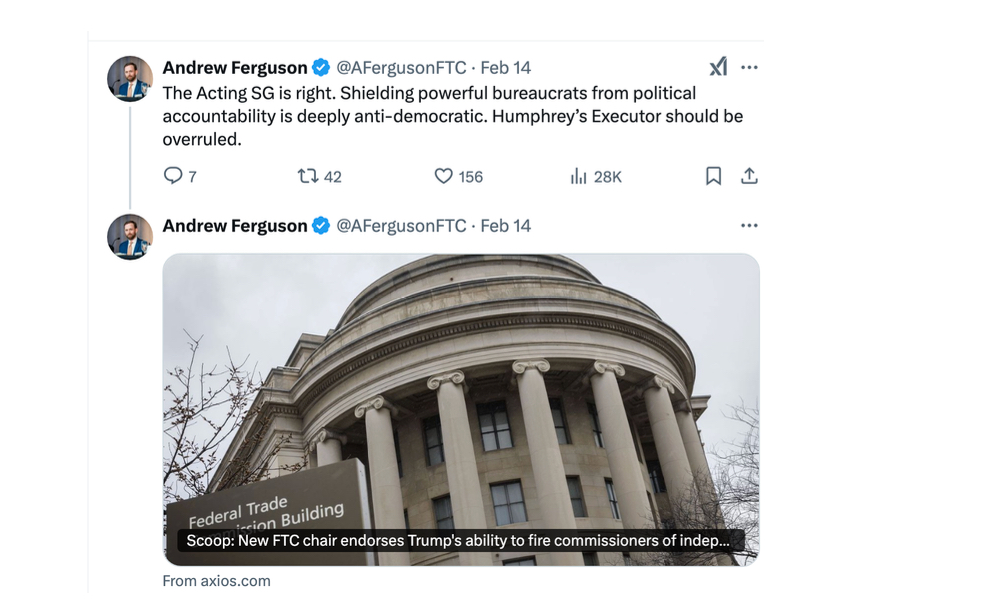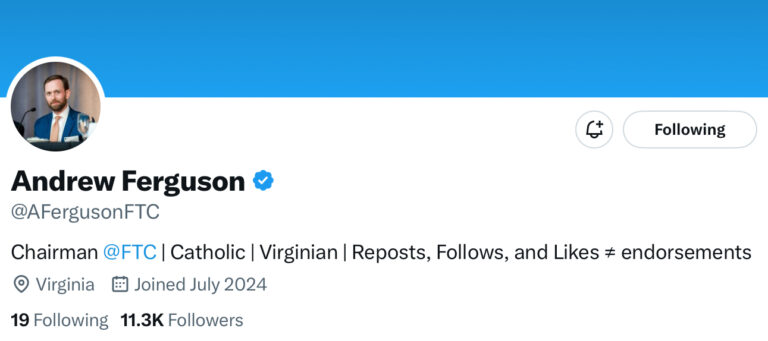FTC Chairman Andrew Ferguson, freshly appointed by President Trump, made what seemed to be a stunning announcement. On X, he posted that the FTC and DOJ would continue to use the 2023 Merger Guidelines, as conceived by his predecessor, Lina Khan. This appeared to be a stunning victory for New Brandeisians, one that upset the usual group of people who get upset any time there might be a whiff of antitrust enforcement anywhere.

New Brandeisians similarly rejoiced, glad that the work that they put into the Guidelines would continue to be recognized and utilized.
On the other hand, to quote singer-songwriter Steve Earle, I was “just staring at the screen, with an uneasy feeling in my chest, I’m wondering what it means.”
Then the follow-up posts, at least to me, added some cause for concern:

That is a fair point. It is destabilizing to an agency to play political football with the Guidelines, although that has been done before.
On the other hand, there has been some consistency throughout. The drive toward weighing efficiencies claims against merger-related harms is one example. A 1997 update to the Guidelines solidified those efficiency claims, and the 2010 Guidelines reinforced them. To the dismay of some progressives, the 2023 Guidelines did not abandon them. Indeed, there is some consistency in the current Guidelines, restoring the original HHI thresholds and keeping the efficiency rebuttal, against my wishes.
Chairman Ferguson is also right that the FTC has limited resources—a perpetual problem for antitrust enforcement agencies. And the Chair has shown his eagerness there, proudly proclaiming the end to the FTC’s DEI programs in response to President Trump’s executive order. Though it’s not clear how much money that will save.
And of course, the Chair is correct in the following post:

The FTC and DOJ have used the same Guidelines used by previous administrations. There is a reason for that: None of those administrations essentially altered the nature of merger review after 1980.
My concern is a bit deeper. Because even short of retraction, it is always possible to simply abandon or ignore the Guidelines. One recalls the abandonment in the 1980s of the Non-Horizontal Merger Guidelines, as well as the abandonment of the potential competition doctrine (brought back to life by the FTC’s challenge of Meta’s acquisition of Within). For a period of time, the only good merger case to bring at the enforcement agencies was a horizontal one.
But another reason one might not care about what the Guidelines say, and this may give some comfort to the anti-enforcement crowd, is that perhaps Chair Ferguson does not think the Guidelines are all that important. His post states, “Courts will not rely on guidelines that are transparently partisan either.”
Chairman Ferguson in his “pitch document” for the position of FTC Chair stated he planned on ending “Lina Khan’s war on mergers.” He also stated that her investigations were “politically motivated.” In the same document, he asserts that most mergers “benefit Americans.” Thus, it is hard for me to see that retaining the Guidelines—which his memo to staff suggests is just a reiteration of caselaw—is a huge win.
New Brandeisians may take comfort in Chairman Ferguson’s harshness toward “Big Tech” and his retention of the 2023 Merger Guidelines (for now). But I want to know if it is for the right reasons. Does his decision express a true admiration for antitrust enforcement or some deeper political calculus? For example, after the ABA issued a statement suggesting that the rule of law be followed, Chairman Ferguson prohibited FTC political appointees from speaking at ABA events:

While the ABA is definitely on the side of Big Tech, and the ABA Antitrust Section did in fact publicly oppose the American Innovation and Online Choice Act (AICOA)—a law designed to regulate self-preferencing by dominant platforms such as Amazon outside of antitrust laws—the ABA is hardly a radical left-wing organization, particularly the ABA Antitrust Section. So, it is reasonable to see this move as a punishment for the ABA’s message about the rule of law, not their support of Big Tech.
Also are any other organizations beholden to the economic interests of parties with business before the FTC? I notice it’s still totally fine for political appointees to speak at Chamber of Commerce, Federalist Society, or CPAC events, apparently.
Chairman Ferguson has also stated that President Trump should be able to fire FTC Commissioners at will.

This license to fire from the Chair, combined with the fact that Big Tech has supported President Trump in significant ways, suggests that New Brandeisians should not be prematurely signaling enthusiastic support for the Chair.
To wit, corporations and CEOs in tech, AI, and cryptocurrency have donated millions to President Trump, including Amazon, Meta, Google, Microsoft, Uber, Ripple (Crypto), Uber’s CEO, Meta’s CEO, Apple’s CEO, and OpenAI’s CEO. Thus, if the Chairman is calling the lawyers of President Trump’s leftist, it might not be anything other than a performative gesture. And calling someone leftist is a performative gesture we’ve seen before.
Which raises some other concerns. It is possible to get the right answer for the wrong reason.
Is the Chairman truly pro-enforcement, and therefore against concentrations of economic power. If so, why is he wanting to halt the “war on mergers?” Why is he seemingly only worried about Big Tech’s economic power?
For example, the Chairman seemed annoyed when Commissioner Bedoya called for an investigation into egg prices, noting the industry’s soaring profits. This blowback reinforces the notion that the Chair doesn’t object to the exercise of power outside of Big Tech.
The motivation for the Chairman’s recent actions matter. And we will not know for sure until we see whether the Chairman is prone to full hard-core enforcement, cheap settlements, or no enforcement at all.
Until then, it is mostly just tweets.
